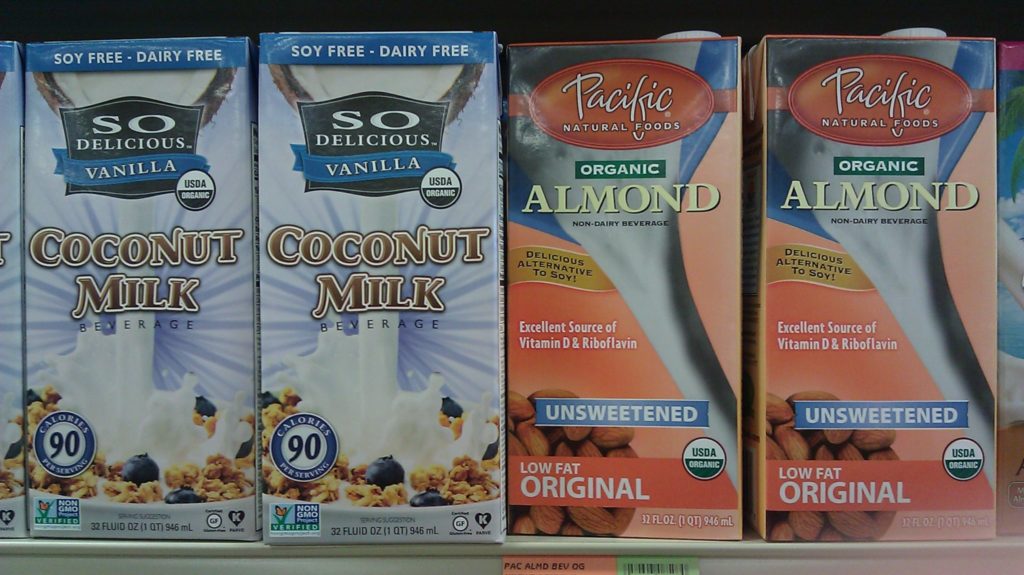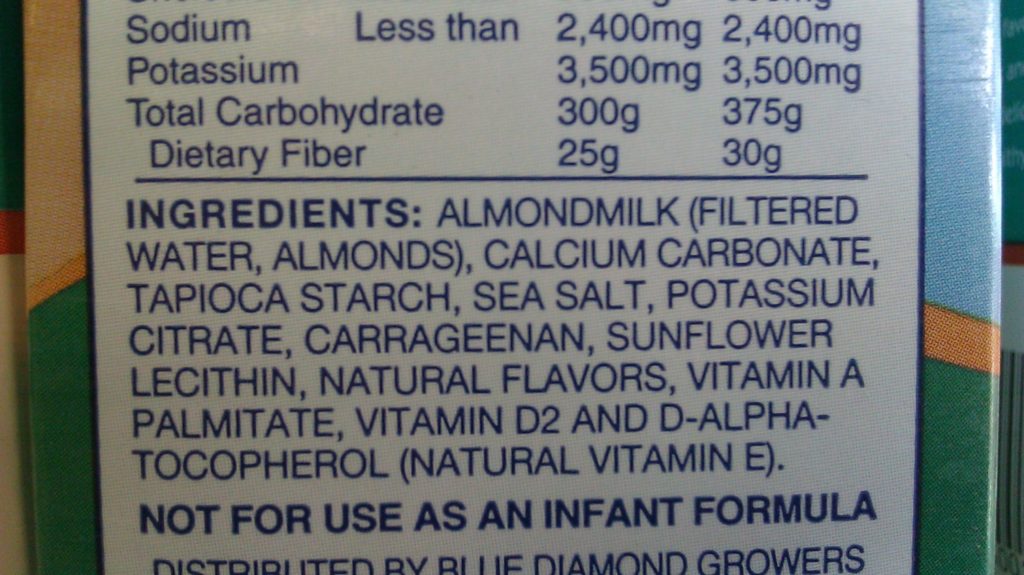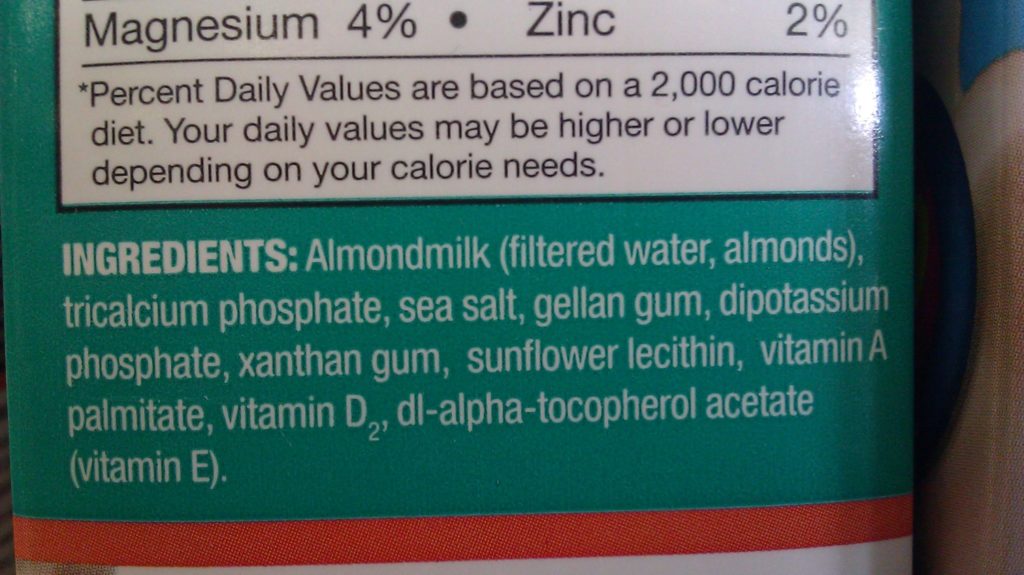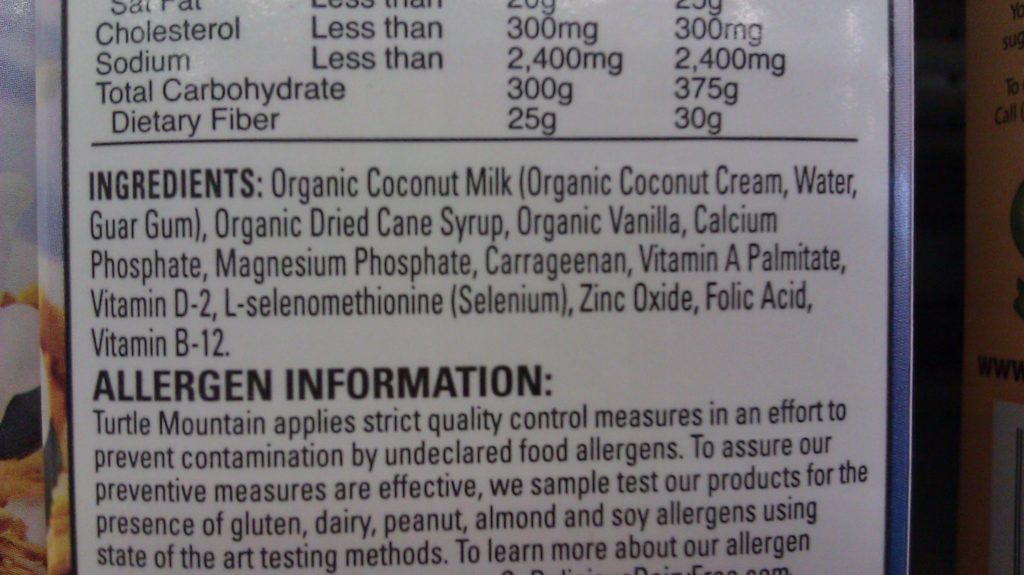 Organic coconut milk and almond milk are common purchases at the health food store by those with dairy allergies. Usually, these people are savvy consumers who know enough nutritionally to avoid soy milk with its endocrine disrupting isoflavones and gastric inflaming phytates. Rice milk is also steadily declining in popularity as it is really not much more than a glass of sugar water nutritionally speaking.
Organic coconut milk and almond milk are common purchases at the health food store by those with dairy allergies. Usually, these people are savvy consumers who know enough nutritionally to avoid soy milk with its endocrine disrupting isoflavones and gastric inflaming phytates. Rice milk is also steadily declining in popularity as it is really not much more than a glass of sugar water nutritionally speaking.
Organic, unsweetened coconut milk and almond milk in cartons seem like great alternatives at first blush, but are they really as “healthy” as people believe?
Let’s take a look at the labels. I was shocked at what I found.
Check out the labels of the three brands I photographed. I checked all the brands, by the way, and they all contained the same dangerous additives I’m about to describe.

First, Vitamin A Palmitate is added, the synthetic version of Vitamin A. I personally avoid synthetic versions of Vitamin A like the plague. Every single multi-vitamin I’ve ever examined contains some form of synthetic A, including the so called “whole foods” multis.
Synthetic vitamins are the chemical mirror images of the real, natural versions. They can cause imbalances over time. Even small amounts of the synthetic fat soluble vitamins like Vitamin A can prove toxic and should be strictly avoided!
The Organic Consumers Association warns that isolated vitamins such as those produced synthetically cannot be recognized or metabolized by the body in the same way as the natural version.

Large doses of natural vitamin A are well tolerated by the body as established by researchers decades ago, however. Traditional diets contain 10 times or more of the RDA of this nutrient with no ill effect. However, synthetic vitamin A is associated with birth defects and bone fractures. It has no benefit in the diet whatsoever.

The second really bad additive in these organic cartons of coconut milk and almond milk is Vitamin D2. Vitamin D2 is a form of the wonder vitamin that you should take great pains to avoid.
In all known cases of Vitamin D toxicity where the dose was intentional, Vitamin D2 was the culprit. By comparison, Vitamin D3 is much less toxic and requires an enormous or even an accidental dose to produce any toxic effect.
Vitamin D2 is manufactured industrially by irradiating yeast. It is dangerous for D2 to be added to any food product particularly if this product would be given to children, where toxicity symptoms would appear at much lower dosages.
None of the store brands of cartoned coconut milk or almond milk were free of these dangerous and synthetic versions of the fat soluble vitamins!
Notice also that carrageenan is present in 2 of the 3 products as well! Dr. Andrew Weil has been telling people to avoid carrageenan since 2002.
Carrageenan is so toxic and inflaming to the human digestive system that this food additive is formally classified by the International Agency for Research on Cancer (part of the World Health Organization) as a potential human carcinogen.
In my view, it would be a mistake to purchase and consume these items. They are in no way health promoting or beneficial, particularly for growing children!
Healthy Alternatives to Coconut Milk and Almond Milk in Cartons
Coconut milk and almond milk should be healthy and they can be if they are produced at home without these dangerous additives. I wrote an in depth post on how to easily make these nondairy beverages yourself. This recipe for wild rice milk is a good option as well.
Believe it or not, even organic coconut milk in BPA free cans would be a better alternative to cartons of coconut milk based on my label inspection!
Check out my video on homemade coconut milk and my article on how to make healthy DIY almond milk, fermented to add probiotics and enzymes to boost immunity and improve digestion.
Sarah, The Healthy Home Economist
Sources
From Seafood to Sunshine: A New Understanding of Vitamin D Safety







I have been using SO Delicious Unsweetened Coconut Milk for a few months now. I usually pour it in my oatmeal and a couple of cups of coffee daily, about 1 – 2 cups daily use. I started using this product because of an episode I saw on the Dr. Oz show. I, like Liz above, found this page on a curiosity search and am a little concern about the Vitamin A palmitate and Vitamin D2. If the alternative to cow’s milk coconut is healthy, how can we avoid the additives? Are there other products in the market you can recommend?
It seem like everything we try to consume that should be healthy turns out not so.
I’ve been trying to find somewhere else on the web that describes what you’re saying about Vitamin A palmitate and I just can’t find anything so negative.. I’ve been trying alternatives for milk and I found this page on a curiosity search to see if I could find downsides to it.. And from what I’ve researched past this post, based on what you’re saying, the vitamin a palmitate in these kinds of drinks are synthetic so as to appeal to vegans, because it’s usually animal derived, and vegans don’t like that… And overdoing it on any vitamin or food, or anything ever in general can harm your body, so yes, it can eventually cause an ‘imbalance’ if only in that you overdose on it. I am still not convinced that this can possibly be something that causes me not to drink the stuff, considering that I drank milk for 21 years only to find out recently that milk is horrible for you.. This seems to be a pretty decent alternative
This article was overwhelming to say the least.
Are you saying that findings show something about the cartons themselves is leeching into these milk alternatives?
Or, is it what is added to them? They can add stuff to cans, and let me know where BPA-free cans are, because I’ve never seen them. Even if BPA-free, cans just don’t seem like the best choice for any ingestable item.
Another reason the article is misleading is Mrs. Sarah should have also taken a photo of a carton of cow’s milk from the grocery store shelf to be fair.
I’m looking at a photo of a gallon of Great Value Brand Fat-Free Milk and this is the ingredient list:
Ingredients: Fat-free milk, Vitamin A Palmitate, Vitamin D3
The fact that synthetic Vitamin A Palmitate is a harmful ingredient is not incorrect or misleading, but that she chose to single out ONLY the non-dairy products (that mostly appeal to vegans) to bring attention to this dangerous additive.
If she truly wanted to make this post an educational experience for her readers (dairy consumers and non-dairy consumers alike), she should have also mentioned that commercialized cow milk also contains the harmful Vitamin A Palmitate ingredient as well.
Not good for dairy consumers who are unable to purchase raw cow’s milk as she suggests.
Your first picture is somewhat misleading as Pacific Natural Foods Almond Milk doesn’t contain the ingredients you warn about.
🙂
Ewen, I just checked the Pacific Natural Foods site…and all of the milks contain carageenan or some sort of “gum,” Vitamin A Palmitate, “natural flavorings” (which should raise a red flag…), and Vitamin D2. *sigh*
You can make your own almond milk at home with out the “nasty” synthetic vitamins. The ingredient list: almonds. Period.
so… i read everyone’s commnet…can come to a conculsions that under any circumstances DO NOT give milk to ur kids…..But then what to do…..i work and teach and tutor….and have NO time to make my.own…BUT still think my kids should drink some sort of milk to get their Vitamins and Calicum….
Pls. help what do i do? what can i give them……
i just started buying almond milk heard it was suppose to be good for..u…BUT now i am confused and dont know what to do…
PLS HELP!!!
What a Bummer. Thought I was doing ok. I like the taste of almond milk. Will have to make my own I guess. Doesn’t it tear up your blender?